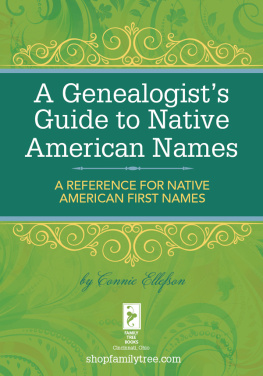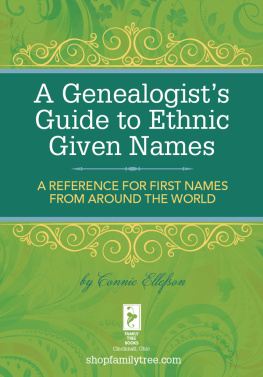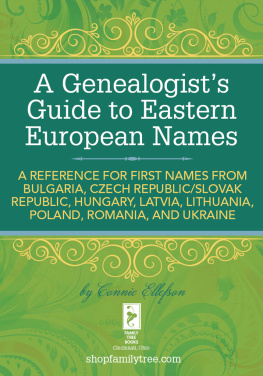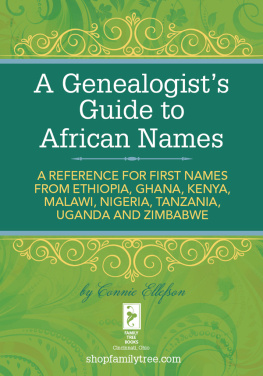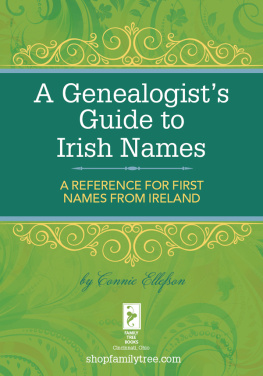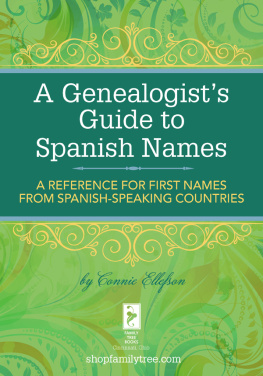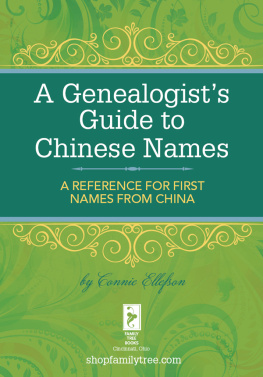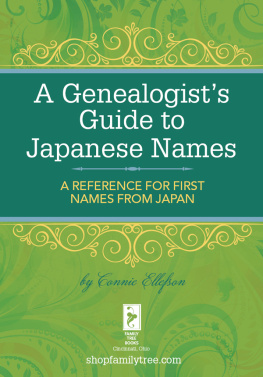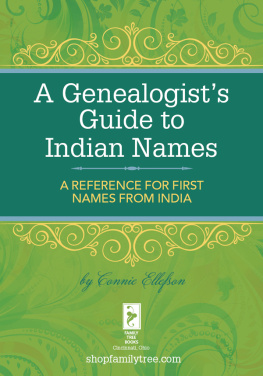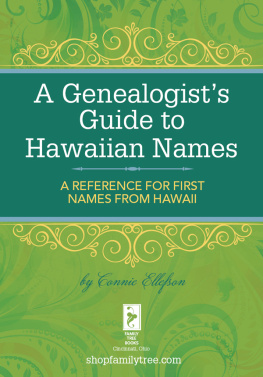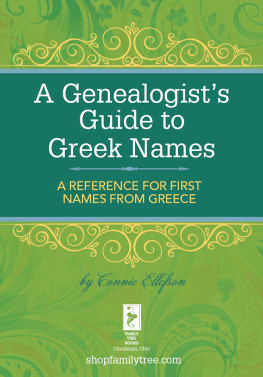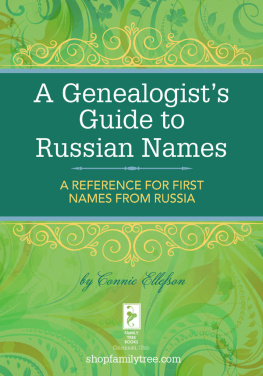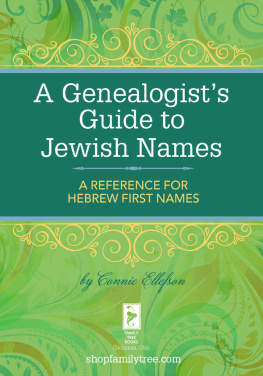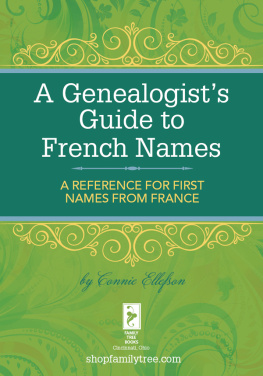A Genealogists Guide to Native American NamesA REFERENCE FOR NATIVE AMERICAN FIRST NAMESby Connie Ellefson Cincinnati, Ohio shopfamilytree.com
Native American Names
History
The first immigrants to North America probably crossed the Bering Strait of Alaska (then a land bridge) from Asia between 10,000 and 20,000 years ago. Later groups may have sailed across the Pacific. Little else is known about Native American civilization until European explorers and settlers began arriving in the sixteenth century. The population at that time in the area of the future U.S. has been roughly estimated between 900,000 and 1.5 million. Firearms and European diseases, especially smallpox, malaria, tuberculosis, typhus and cholera, took their toll on the native population.
By 1880, the population was down to 250,000. Before that, the pressure of the European presence caused the Sioux and Apache tribes, among others, to change their lifestyles. The Chippewas (Ojibwa is the native term) who lived in the northern Great Lakes region responded to the French demand for furs by pushing west in search of additional hunting grounds. This migration displaced the Sioux tribes causing them to head west, where they became buffalo hunters with the aid of the European horse and weaponry. The Apache, the last Native Americans conquered by the U.S. Cavalry, had migrated south from Canada even before the Spaniards arrived in the 1500s.
They developed a raiding way of life, which, more than any other image, has influenced the American perception of the stereotypical American Indian. In fact, Native Americans lived many different ways of life, ranging from simple groups of food gatherers to farmers living in city-states (such as the Pueblos) to organized political confederacies. The population of Native American or part-Native American ancestry now numbers over one million. More than half of them live on reservations across the country. Of the estimated 200 cultures, or nations, as they were called by the early Europeans, at least 170 existing tribes maintain a cultural identity.
Language
Many of the Native American languages had vocabularies of 7,000 to 10,000 words.
Language
Many of the Native American languages had vocabularies of 7,000 to 10,000 words.
Although this seems small compared to the total English vocabulary of 130,000 words, most English-speaking people have a vocabulary of only about 10,000 words. Because the Navaho language is so complex, it is almost impossible to counterfeit or learn as an adult. The same syllables given different pronunciations have entirely different meanings. During World War II, a group of 420 Navahos were trained as code talkers. They were able to transmit communications about Pacific troop movements without the time-consuming step of encoding and deciphering the messages and fear of the messages being intercepted.
Naming Traditions
The naming traditions among Native Americans were as varied as the cultures.
Naming Traditions
The naming traditions among Native Americans were as varied as the cultures.
Many were conceptual names, which were passed down through many generations. If a baby was given a name of a living relative, the name might be changed slightly. Thus, Little White Bear might be named after Walking Bear. In some tribes, notably the Kiowas, it was taboo to name a child after a recently deceased relative. In fact, when a relative died, entire families had to change their names, and all terms suggesting the name of the dead person were dropped from the language for several years. In many cultures, it was believed that everyone and everything had a name that might remain long unknown to all, even to the owner, and that perfectly expressed ones inmost nature.
The name might be revealed to the person confidentially at some point, but the name always had such a sacredness to it that it was considered a discourtesy to directly address the person by it. Sources for names included totemsanimal, plants, objects or vain revered by the tribe (Navaho names often reflect events of war). Other names evolved from a noticeable characteristic of the baby (not given until sufficient time had passed to discern the characteristic), an image revealed to the father in a dream, or an event or object that impressed the mother at the time of the birth. Realizing that roughly one million Native Americans inhabited the U.S. before the white man came to a land that now houses 240 million people, it is not hard to see the overwhelming part that nature played in the culture of the Native Americans and their choices of names.
Pronunciation
Since many Native American languages are unwritten, most names in this list are phonetic representations of how the name sounds in dialect.
Pronunciation
Since many Native American languages are unwritten, most names in this list are phonetic representations of how the name sounds in dialect.
The vowel pronunciation follows the general guide shown on page iv. Pronunciation is given for some names and the tribal name is given in parentheses.
Native American Female Names
Abedabun (Chippewa) peep of day
Abequa (Chippewa) she stays home
Abeque (Chippewa) she stays at home
Abetzi (Omaha) yellow leaf
Abey (Omaha) leaf
Abeytu (Omaha) green leaf
Adoette (ah-do-AY-tuh) big tree
Adsila (Cherokee) blossom
Aiyana eternal bloom
Alameda cottonwood grove
Alaqua (ah-LAH-quah) sweet gum tree
Aleshanee (Coos) she plays all the time
Algoma valley of flowers
Alkas (Coos) she is timid
Altsoba (Navaho) all are at war
Amadahy (Cherokee) forest water
Amayeta (Miwok) big manzanira berries
Amitola rainbow
Anaba (Navaho) she returns from war
Anevay superior
Angeni spirit
Anpaytoo (Sioux) day, radiant
Aponi butterfuly
Aquene peace
Atepa (Choctaw) wigwam
Awanata (Niwok) turtle
Awenasa (Cherokee) my home
Awendela early day
Awenita a fawn
Awinita (Cherokee) young deer
Ayashe (Chippewa) little one
Ayita the worker
Ayita (Cherokee) first in the dance
Bena pheasant
Bly high, tall
Chapa (Sioux) beaver
Chapawee (Sioux) industrious
Chenoa white dove
Chilali snowbird
Chimalis bluebird
Chitsa fair one
Cholena (Delaware) bird
Chumani (Sioux) dewdrops
Cocheta (sho-CHAY-tah) the unknown
Dena a valley
Dezba (Navaho) going to war
Doba (Navaho) there was no war
Doli (Navaho) bluebird
Donoma (Omaha) visible sun
Dowanhowee (Sioux) singing voice
Dyani a deer

